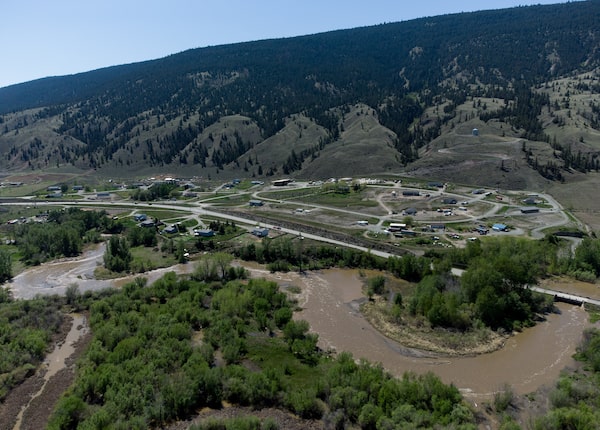
The swollen Bonaparte River runs through the Bonaparte First Nation north of Cache Creek, B.C., due to unseasonably hot temperatures on May 14.DARRYL DYCK/The Canadian Press
Environment and Climate Change Canada says unseasonably hot weather in British Columbia’s Okanagan, Thompson, and Boundary regions will push temperatures into the mid 30s into the weekend.
Environment Canada issued heat warnings Friday covering portions of the province’s Interior, saying the hot weather was expected to persist through to Sunday.
The agency says daytime temperatures are expected to reach 38 Celsius in the Boundary region, while temperatures in the south and central Okanagan, south and north Thompson, and Fraser Canyon regions will reach up to 36 Celsius.
The latest heatwave has broken records in parts of the province, including a 38.2 Celsius temperature in Nelson on Thursday, surpassing the last high from 1938, while records were also set in McKenzie, Nakusp, Richmond and Smithers.
WorkSafeBC says the warnings should be a wake-up call to employers as it’s been dealing with increasing claims related to heat from people who work both indoors and outside, including farm workers, kitchen employees and construction workers.
WorkSafe, the provincial worker’s health and safety agency, says in an advisory that heat stress-related injuries have been on the rise in the last few years, averaging 41 claims between 2018 and 2020, rising to a peak of 115 claims related to the heat dome event in 2021.
Climate change-fuelled heat waves forecast a new global weather reality
Environment Canada has also issued heat warnings for much of southern Alberta and into southeastern Saskatchewan.
The federal agency says temperatures could reach 37 Celsius this weekend in some areas of Alberta.
It says the extreme heat is expected to continue into early next week.
The warnings include the cities of Calgary, Lethbridge and Medicine Hat, as well as dozens of smaller communities across southern Alberta and Saskatchewan.
Residents and visitors are urged to take precautions such as rescheduling outdoor activities to the cooler hours of the day, taking frequent breaks and drinking plenty of water to stay hydrated.
Environment Canada says heat warnings are issued when high temperatures could pose an elevated risk of heat stroke or heat exhaustion.